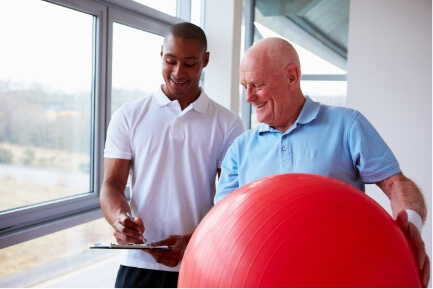Balance & Gait Disorders
How Physiotherapy Can Help Improve Your Gait and Steady Your Balance
Do you ever catch yourself using a wall or piece of furniture for support when you’re standing up? Do you ever experience pain in your knees, hips, or other joints that changes the way you walk? If you’re nodding after reading those sentences, you might be dealing with a gait or balance disorder.
Gait and balance disorders do not only physically disrupt your life, but they can be disrupting your mental health as well. They develop for a multitude of reasons. If you have underlying neurological or musculoskeletal problems, these can amplify and irritate a gait or balance issue. Thankfully, you don’t have to deal with this alone. Physiotherapy can drastically decrease the symptoms you have and even correct your gait or balance issue altogether. If you’d like to learn more about how you can start improving your balance and gait condition, get in touch with ProActive Physiotherapy to schedule an appointment today.
What’s the difference between gait and balance disorders?
Gait and balance disorders are included in a group of functionality issues that can interfere with the way you normally walk or run, your ability to keep yourself standing up straight, and your overall positional awareness.
Balance & gait disorders are closely related, but they do have a few differences. Balance disorders are not only physical issues, they’re mental as well. As crazy as it sounds, your brain can trick you into thinking you’re moving when you’re still. Any change to your mobility, joint strength, and ability to sense where your joints are, all have an impact on your balance.
Gait disorders cause abnormalities in your physical movements and these issues will get worse with age. According to Move Forward Physiotherapy, gait disorders account for 17 percent of cases of elderly people falling.
What causes balance and gait disorders to develop?
Gait and balance disorders can develop as a result of many different factors and underlying causes. With balance disorders, many are linked to problems in the vestibular system, which is an intricate collection of sensory nerves and chambers filled with fluid, located in the inner ear as well as the thousands of nerve receptors in your joints. The vestibular system plays a hand in “proprioception,” or your overall sense of position.
Some balance disorders result from the following common vestibular conditions:
Getting injured or becoming ill
Regardless of whether your brain and nervous system are working perfectly with each other, a disease, sudden injury, or other problem causing muscle weakness can interfere with your balance and make it hard to stay standing upright.
Neurological problems
For example, brain injury, stroke, or Parkinson’s disease. Any problem affecting your neurological system can also interfere with your balance.
Benign paroxysmal positional vertigo (BPPV)
BPPV happens when bits of calcium break off in the inner ear, causing issues with balance. This can be extremely disorienting and uncomfortable.
Can physiotherapy help with my gait or balance disorder?
Physiotherapy is the best possible option when it comes to improving your balance and ability to walk. One of our licensed physiotherapists in the Edmonton, AB area will provide you with a comprehensive physical evaluation to examine your gait, balance, stance, symptoms, and medical history. They will then create a personalized treatment plan for your individual needs. This treatment plan may include:
Vestibular rehabilitation
This kind of physiotherapy works to improve your vestibular system as a whole, including your vision, nerves, and muscles, to maintain a steady balance. If you are dealing with BPPV, our Edmonton, AB physiotherapists can help you learn specific exercises that can dislodge and move the loose calcium debris to the correct parts of your ear.
Retraining your gait
Sometimes, irregularities in gait can be fixed through “gait retraining” where you learn proper movement patterns.
Strengthening exercises
During your evaluation with your physiotherapist, they will be able to focus on the problem areas in your body that need help. Your physiotherapist will also teach you helpful strengthening exercises you can do on your own, that will build up your muscles. You will move around much more easily. Also, you will have a lower chance of getting injured.
Lots of stretches
Stretching is one of the easier treatments your physiotherapist might suggest. This helps to improve your range of motion and flexibility, thus giving you more control over your movements. Stretching will also prevent your muscles from becoming too stiff or tight. If you’ve been struggling with keeping your balance, it’s time to get checked out. There’s no reason you need to keep suffering from gait and balance issues. Contact us today at ProActive Physiotherapy to schedule an appointment with one of our licensed physiotherapists. We’ll make sure you’re back (and upright) on your feet in no time at all!
Sources:
- https://www.moveforwardpt.com/SymptomsConditionsDetail.aspx?cid=1bb9c784-a874-43b1-976f-d0de03c19f99
- http://www.apta.org/BalanceFalls/
- http://www.apta.org/Media/Releases/Consumer/2008/1/14/
- http://blog.arthritis.org/osteoarthritis/knee-pain-oa-walking/
- https://www.moveforwardpt.com/SymptomsConditionsDetail.aspx?cid=8b727ed1-48d5-48b3-9b11-dd8fcec59417
- https://vestibular.org/understanding-vestibular-disorders/treatment/canalith-repositioning-procedure-bppv



